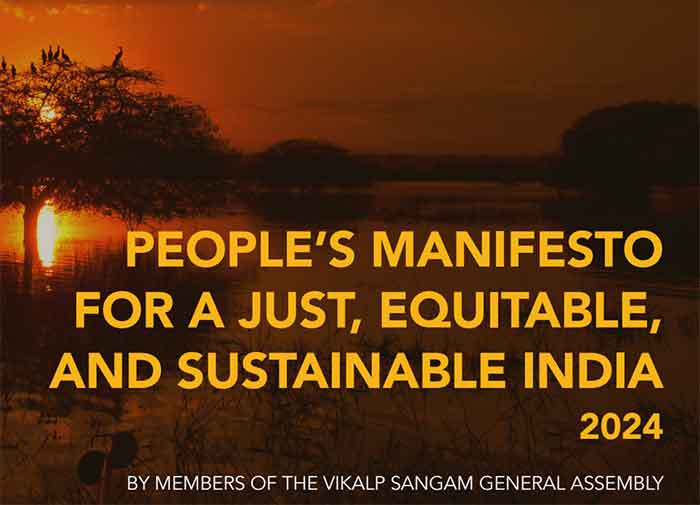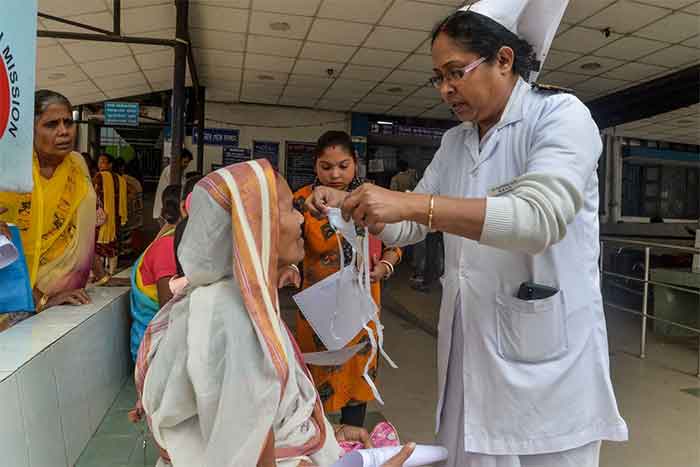21 Demands by 85 Civil Society Movements and Organisations

India needs a fundamental re-orientation of the economy, society, politics, culture, and environment, in order to resolve the growing crises of unemployment, malnutrition, social conflict, ecological collapse and decline in democratic rights. We urge the following action through full public support in public policies, programmes and adequate finance including budgetary provisions.
- Vulnerable sections of society, including women, sexual minorities, Dalits, Adivasis, people with disabilities, and other economically vulnerable populations, be given priority in welfare schemes, while their human rights are protected and their central participation in decisions making is enabled.
- Specific measures to reduce gross economic inequalities, including caps on salary levels, basic minimum income and employment guarantee for the most vulnerable, pension for all workers in the primary sector, high taxation on income, wealth and inheritance of the rich, restraints on luxury and wasteful consumption, and steps to curb the enormous ‘black economy’.
- Programmes for re-establishing harmony amongst people of different faiths, ethnicities, languages, and cultures, and prompt action against those spreading misinformation, hatred, and enmity.
- Full democratic rights to gram sabhas and urban area/mohalla sabhas, including financial and legal powers, and mandatory prior informed consent for any activities affecting them especially related to land use.
- A comprehensive policy and law to ensure accountability and transparency of all institutions of the state, political parties, corporations, financial institutions, and media houses.
- Repeal of laws/provisions that enable stifling of democratic dissent or provide draconian powers to police and armed forces, including UAPA, NSA, and sedition clause of IPC.
- Promotion of livelihoods that combine traditional and modern skills, with highest priority to agriculture, crafts, and small manufacturing at decentralized levels, and ecological regeneration; and extension of MNREGS and other employment security schemes to urban areas.
- Reservation for micro/small/medium scale, especially handmade, of all products/services that can be made through community-based producer collectives (such as textiles, footwear, household goods).
- Framing of national land/water use plan and policy, through widespread consultation, for conservation of ecosystems and the commons, wildlife and biodiversity, ensuring collective rights to communities dependent on them (e.g. laws similar to the Forest Rights Act, for rivers, marine areas, grasslands, etc).
- Budgeting for a country-wide programme of localised land/soil and water regeneration oriented at creating sustainable natural resource assets for local community economies.
- Mandatory environmental and social impact assessments of projects, programmes, schemes and sectors, through independent agencies, with full participation of affected communities, and ensure at least a full year of ecological assessments.
- Replacement of all chemicals and other substances that are harmful to human or ecosystem/animal health, by ecologically sensitive substances.
- Ensuring universal access to adequate, safe food and water, and energy, through ecologically sensitive, decentralized, and democratic means. This includes all food production through organic, biologically diverse methods, giving priority to small farmers, pastoralists and fishers; decentralized water harvesting and management by communities; and decentralized energy production including rooftop and on-farm methods.
- Revisions of the National and State Action Plans on Climate Change, and Disaster plans, to fully support vulnerable sections cope with and adapt to the climate crisis and other disasters.
- Steps to make urban and rural settlements dignified, livable, and sustainable, with full rights of access to land, housing, and other amenities for vulnerable sections, and priority to public transport, cycling and walking.
- Transformation of all learning and education towards activity-based, enjoyable, culturally and ecologically rooted, mother-tongue based approaches, including through relevant amendments of Right to Education Act; dedicate at least 6% of the GDP to this.
- Programmes to ensure conditions for healthy living and health services for all, through the integrated use of multiple health systems, linkages with other determinants of health (food, social, mental and physical environment, education, etc), community governance and monitoring. Dedicate at least 3% of GDP to this.
- Actions to democratise innovation, technology and knowledge, recognising creativity of ‘ordinary’ people, placing knowledge in the commons, respecting diversity of knowledge systems, and mandating democratic review of all technologies (including those of corporate sector) under development.
- Encourage democratic flourishing of the arts and sports, removing caste, class and gender discriminations embedded in some of them, making them accessible to all, and ensuring independence of public institutions promoting them.
- Re-establish India’s global role as a champion of human rights, peace and demilitarisation, and ecological sustainability, including by revitalising the United Nations, removal of veto powers, and support to people’s participation in it.
- In all the above, give special attention to the empowerment and facilitation of India’s youth, enabling of their own voices in determining the present and the future.
(For the full text of the Manifesto, pl. see: https://vikalpsangam.org/article/vikalp-sangam-general-assembly-to-release-peoples-manifesto-2024/)
This manifesto was released in New Delhi
Contacts:
KJ Joy, [email protected]
Shrishtee Bajpai, [email protected]
Yash Marwah, [email protected]
Asmi Sharma, [email protected]















































